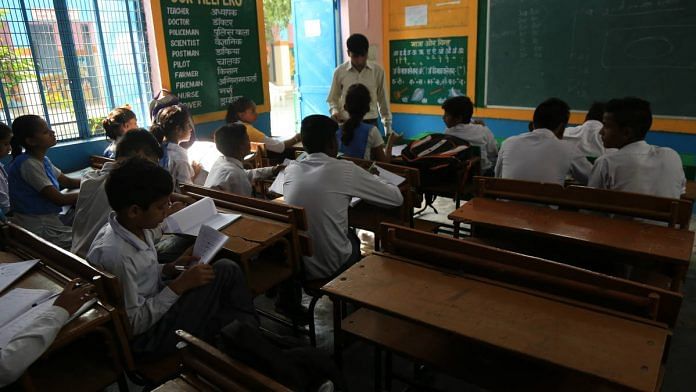New Delhi: Barely three months before board exams, noted Hindi writer Krishan Chander’s story ‘Jamun Ka Ped’, a well known satire on red tape, has been dropped by the Council for the Indian School Certificate Examinations (CISCE) from its class 10 Hindi syllabus.
While the council has not given any reason for the move, the decision is being questioned by noted poets.
“The story, titled ‘Jamun Ka Ped’, by Krishan Chander under short stories of Hindi ICSE (class 10) prescribed textbook will not be tested for the year 2020 and 2021 examination. The concerned teachers and candidates should be informed accordingly,” an official order by the ICSE said.
Gerry Arathoon, Secretary and Chief Executive of the council, refused to comment on the reasons behind the move. It was also not clear whether the decision has been taken for only 2020 and 2021 academic sessions or will be reversed later.
‘Jamun Ka Ped’, written in the 1960s, is a satire on bureaucratic red tape told through the story of a well-known poet who gets trapped under a jamun tree in the lawns of a secretariat building after a thunderstorm.
Also read: Modi govt’s draft education policy a disappointment for disabled kids, burdens parents
The tree needs to be cut for the poet to be rescued but the story talks about how the buck keeps on passing from a gardener, who reports the matter to a peon, who takes it further to the clerk and then it reaches the building superintendent.
After a clearance from the forest department, the request lands up with the culture department since the person involved was a poet, who then passes it to the foreign affairs department as the tree was planted by the prime minister of a neighbouring country.
The department rejects the request saying it may affect ties with the country and ultimately the matter is referred to the Prime Minister’s Office but the PM is on a foreign trip.
The request is placed before the prime minister when he returns and ultimately a go-ahead is given for cutting the tree to save the man. By the time the order from the PMO reaches the building superintendent, the poet dies.
Besides writing in Hindi and Urdu, Chander also wrote in English. He also penned screenplays for noted Bollywood films like ‘Dharti Ke Lal’, ‘Mamta’ and ‘Sharafat’.
Veteran Hindi poet Ashok Chakradhar said the students are mature enough to understand the satire.
“I think students of class 10 are mature enough to understand satire and decide what is appropriate or inappropriate. If the decision makers think red tape is over in the country then they should sure remove ‘Jamun Ka Ped’ from textbooks because the story’s purpose has been achieved,” he told PTI.
Also read: New education plan wants to make board exams easier, give more flexibility to pick subjects
Echoing his views, Bhopal-based poet Rajesh Joshi, whose poems are also prescribed in government schools and colleges, said, “It is not like students of class 10 do not understand what corruption is…The government should be able to face it. This situation is like removing a mirror from your house instead of fixing your face.”
Author and leading satirist Sampat Saral said he saw no reason with the language or content of ‘Jamun ka Ped’ being inappropriate for teenagers.
“This particular story is among the top 10 best satire works that I have come across.The students who now study complex mathematical and scientific problems in schools are aware of what is happening is establishment. How files get stuck in the red tape of the system for years. The establishment has always fears satire,” said Jaipur-based Saral.
A Hindi teacher in tier-3 city school in Uttar Pradesh said ‘Jaamun ka Ped’ never lost its relevance in the two decades of his career and his students were “disappointed” by the decision.
“When I told children in class that this story has been removed from the course, they were disappointed. They demanded that another ‘boring’ story be removed instead as they liked ‘Jaamun ka Ped’ a lot,” the teacher said on the condition of anonymity.
“It is a brilliant story laced with satire that teaches readers to value human life and be decisive and responsible towards their job, as against the characters in the story – from peon to a joint secretary in the government – wait for the prime minister’s order to remove a man who dies after a tree falls on him. These children are the bureaucrats of tomorrow and the story showed them the reality,” he added.






